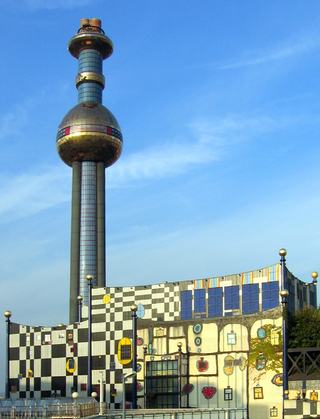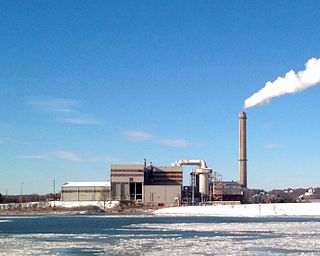
Incineration is a waste treatment process that involves the combustion of substances contained in waste materials. Industrial plants for waste incineration are commonly referred to as waste-to-energy facilities. Incineration and other high-temperature waste treatment systems are described as "thermal treatment". Incineration of waste materials converts the waste into ash, flue gas and heat. The ash is mostly formed by the inorganic constituents of the waste and may take the form of solid lumps or particulates carried by the flue gas. The flue gases must be cleaned of gaseous and particulate pollutants before they are dispersed into the atmosphere. In some cases, the heat that is generated by incineration can be used to generate electric power.

A waste-to-energy plant is a waste management facility that combusts wastes to produce electricity. This type of power plant is sometimes called a trash-to-energy, municipal waste incineration, energy recovery, or resource recovery plant.

Kanal, frequently referred to as Kanal ob Soči, is a settlement mostly on the left bank of the Soča River in the Slovene Littoral, the traditional region in southwestern Slovenia. It is the seat of the Municipality of Kanal ob Soči. It is an important crossing point over the Soča. At its eastern border, on the left bank of the Soča, runs the Bohinj Railway, the railway track linking the Central Europe and the Mediterranean.

Nogometni klub Olimpija Ljubljana, commonly referred to as Olimpija Ljubljana or simply Olimpija, is a Slovenian professional football club based in Ljubljana that competes in the Slovenian PrvaLiga, the top division of the Slovenian football league system. They have won three Slovenian PrvaLiga titles and four Slovenian Cups.
Thermal desorption is an environmental remediation technology that utilizes heat to increase the volatility of contaminants such that they can be removed (separated) from the solid matrix. The volatilized contaminants are then either collected or thermally destroyed. A thermal desorption system therefore has two major components; the desorber itself and the offgas treatment system. Thermal desorption is not incineration.

Refuse-derived fuel (RDF) is a fuel produced from various types of waste such as municipal solid waste (MSW), industrial waste or commercial waste.

Waste-to-energy (WtE) or energy-from-waste (EfW) is the process of generating energy in the form of electricity and/or heat from the primary treatment of waste, or the processing of waste into a fuel source. WtE is a form of energy recovery. Most WtE processes generate electricity and/or heat directly through combustion, or produce a combustible fuel commodity, such as methane, methanol, ethanol or synthetic fuels, often derived from the product syngas.

The Karawanks Tunnel is a motorway tunnel crossing the Alpine Karawanks mountain range between Austria and Slovenia, with a total length of 7.864 km, 8.019 km enclosure between the portals. Its construction began in 1986 and it opened on 1 June 1991. It connects the Austrian Karawanken Autobahn (A11) from Villach with the A2 motorway leading to Kranj and Ljubljana in Slovenia, decongesting the historic Loibl/Ljubelj and Wurzen/Korensko sedlo mountain passes.

Dubioza kolektiv is a Bosnian avant-garde dub rock group known for their crossover style that incorporates elements of hip hop, dub, ska, reggae, rock, punk, electronic music, and Balkan music, and for their socially and politically conscious songwriting with lyrics in multiple languages. In 2015, Dubioza kolektiv was referred to as the most popular Bosnian musical act.
China is the largest cement producer in the world. As of 2004, it was responsible for 60% of cement global production. In 2017, China produced 2,400,000 metric tons of cement, whereas other countries produced about 1,728,300 metric tons.

It is estimated that 290 million tonnes of waste was produced in the United Kingdom in 2008 but volumes are declining. In 2012 municipal solid waste generation was almost 30 million tonnes, according to Waste Atlas Platform.

Aalborg Portland is a cement-producing company in Denmark. It was established in Aalborg in the 19th century. Portland cement was patented in 1824 by the Englishman Joseph Aspdin. Six decades later the Aalborg businessman Hans Holm and the engineer Frederick Læssøe Smidth built a cement factory 4 kilometres (2.5 mi) northeast of Aalborg in the town of Rørdal.

Subcoal is a fractional substitute for coal or lignite which uses processed paper and plastic waste. The fuel pellets can be used as a secondary energy source in industrial furnaces, such as lime kilns and cement kilns, coal-fired power stations and blast furnaces. Subcoal has a caloric value comparable with lignite. The technology was developed by the Dutch chemical company DSM. A study by CE Delft revealed that for the paper-plastic fraction of household waste, the Subcoal route has a better climate and overall environmental score as compared to the incineration in a waste incineration plant.
In the run up to the 2018 Slovenian parliamentary election, various organisations carry out opinion polling to gauge voting intention in Slovenia. Results of such polls are displayed in this article.

Parliamentary elections were held in Slovenia on 3 June 2018. The elections were originally expected to be held later in June 2018, but after the resignation of Prime Minister Miro Cerar on 14 March 2018 all parties called for snap elections. They were the third consecutive snap elections after 2011 and 2014.

Uroš Macerl is an organic farmer and environmental activist from Slovenia. He won the Goldman Environmental Prize in 2017 after leading a successful legal challenge against the company operating a cement kiln that was incinerating hazardous waste near his farm.
In the run up to the 2022 Slovenian parliamentary election, various organizations carried out opinion polling to gauge voting intention in Slovenia. Results of such polls are displayed in this article. The date range for these opinion polls are from the 2018 Slovenian parliamentary election, held on 3 June, to the present day. The next parliamentary election was held on 24 April 2022.
Požareport.si is a Slovenian news and opinion website and blog that focuses on political and corruption events, investigative reporting into government corruption, nepotism, government controlled corporations, and personal disclosures about Slovenian politicians, media, and local media personalities and celebrities.
Eren Holding is a conglomerate headquartered in Istanbul, Turkey. It has business interests in paper, packaging, cement, energy, retail and textiles. The holding company was established in 1997, although the history of the group dates back to 1969.
The 14th Government of Slovenia was formed following the resignation of Prime Minister of the 13th Government Marjan Šarec in January 2020. Janez Janša of Slovenian Democratic Party formed a coalition with Modern Centre Party, New Slovenia, and Democratic Party of Pensioners of Slovenia. The government was confirmed on 13 March 2020, amidst the COVID-19 pandemic.












